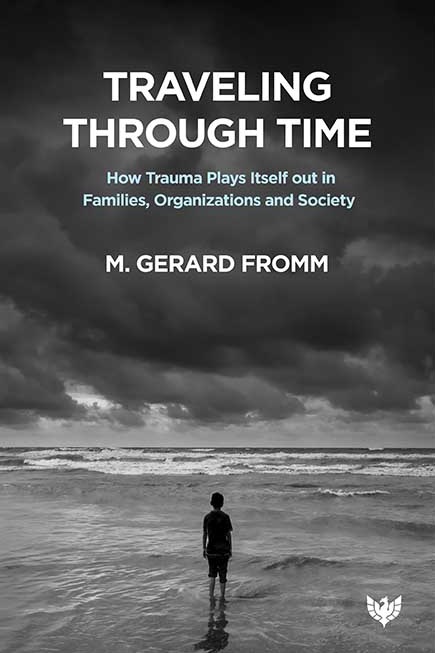Traveling through Time: How Trauma Plays Itself out in Families, Organizations and Society

Book Details
- Publisher : Karnac Books
- Published : 2022
- Cover : Paperback
- Pages : 240
- Category :
Psychoanalysis - Catalogue No : 96103
- ISBN 13 : 9781800130258
- ISBN 10 : 9781800130
Reviews and Endorsements
Traveling through Time is a vivid, nuanced, integrated portrayal of trauma as it exists across time and across social groups. Based on his deep professional engagement with familial, organizational, and societal trauma, Fromm brings to life the experience of the individual in each of those contexts. His psychoanalytic approach emphasizes the dignity of the individual and demonstrates the value of curiosity to understanding such important matters as moral injury and the fear of repetition of trauma, whether conscious or unconscious. He shows us that mourning is required to move beyond grievance to grief, to join past to present, and to create space for an adaptive future. This is a sophisticated book written in accessible language. It is a must read for anyone living or working with trauma.
Harriet Wolfe, M.D., President, International Psychoanalytical Association
What happens to us in the face of unbearable pain? How do our efforts to manage traumatic experience shape our family life, our children’s capacities, our institutions, our society’s development? In this moving book, Dr. Fromm, a master clinician, takes us through these questions with powerfully evocative stories from his long career. He brings our psychological theories to life, illuminating for the general and professional reader aspects of human development that echo across the generations. A stunning collection.
Edward R. Shapiro, M.D., Former Medical Director/CEO, Austen Riggs Center; Clinical Professor of Psychiatry, Yale Child Study Center; author, Finding a Place to Stand: Developing Self-Reflective Institutions, Leaders, and Citizens
This eloquent book examines trauma as it moves through time and takes shape in an “unconscious task deposited into the future,” an unacknowledged history or untold story passed on and enacted in families, in organizations, and in society. Fromm compellingly recounts the stories of children delegated to bring their parents’ unspoken pasts into the present, of organizations whose fragmentation unconsciously communicates a censored history, and of societal structures bound up with what the social or the political realm has not yet assimilated. At the center of this remarkable book is Fromm’s own delicate, subtle act of listening, grounded in his clinical experience and turned not only toward the patients and institutions he encounters but also toward the great psychoanalytic theoreticians, whose work, as he reveals, emerges as a unique task of personal witness. In its movement between individuals and institutions, this book is consistently surprising. And it reminds us, importantly, that the reenactment of trauma demands “the dignity of our listening,” and that the contact with the dead, as Fromm so beautifully shows us, brings life back to the living.
Cathy Caruth, Class of 1916 Professor of English, Cornell University; author, Unclaimed Experience: Trauma, Narrative and History and Listening to Trauma: Conversations with Leaders in the Theory and Treatment of Catastrophic Experience
The true-life stories brought together in this volume really open up the experience of working with traumatized people and communities. But that does not begin to describe its value. This is a book you will come back to again and again. Every few pages you will find a valuable insight or memorable remark. The personal stories of psychoanalytic greats such as Erikson, Bion, and Kohut are fascinating. They shed a new light on the characters and inspired me to return to reading them again. The way the pathology of individuals, families, and communities is woven together is also of great interest. I found myself inspired by the work of Fromm and his colleagues at the Austen Riggs Center’s Erikson Institute. You will be too.
Olivia Brown, Therapy Today
Epilogue, “Anna Freud’s drapes”, provides a “book-end” for this work. Yet I doubt that, for any reader, the influence of the book will end there. We all have our own work to do across families, organisations, and communities. This ending is a touching tale of the scavenging of Anna Freud’s curtains from being cast into a builder’s skip in London, their transformation, neglected, into the author’s back office, and then with a good wife’s creative genius, into gifted cushion covers, marking a psychoanalytic bequest, down generations. This provides a rich and wry tale of a bequest that is also this book’s gift to bestow. As so often the author resorts to the poetic to describe the ineffable and transcendent meanings of such psychoanalytic engagement, for whatever will be the next stage of our various journeys.
Richard Morgan-Jones
Fromm demonstrates an ingenious way of listening and of understanding which is one of the great inspirations of the book. He also has a special way of writing. It is eloquent – at times poetic – and a very personal way of writing. This is worth underlining as it brings the reader into the material, and the experiences described are often very difficult to take in and to reflect upon. It took this reviewer a long time to read the book. This was, however, necessary as the book presents the worst of humankind’s history. But Fromm also offers ways to deal with trauma and also hope. Fromm has a way of leading the reader gently but firmly into matters that we will need to deal with in years to come.
Sverre Varvin, International Journal of Psychoanalysis, 2023, (104)(6):1136-1139
An ethos of insightful caring pervades this book. [...] Most of the chapters in this book are reworkings of previously published writings that have been assembled in such a way that they effectively complement each other.
John Rosegrant, Psychoanalytic Psychology, American Psychological Association 2023, Vol. 40, No. 2, 141–142

